
Guests
- Ro KhannaDemocratic congressmember from California.
We speak with Democratic Congressmember Ro Khanna about his bipartisan bill calling for the full release of federal documents pertaining to Jeffrey Epstein’s criminal charges for sexual trafficking and abuse, which is also currently backed by nine Republicans and every House Democrat. Khanna explains why he’s calling for transparency and accountability regarding the Epstein case, and how Trump is working to prevent the same.
Ro Khanna also discusses the massive loss to public media and local news as the Trump administration has successfully stripped $1.1 billion from the Corporation for Public Broadcasting, which funds over 1,500 NPR and PBS stations across the country. The major cut to funding is possible thanks to the rare process of rescission, which allows the president to request Congress to rescind already-allocated federal funding. Trump’s OMB Director Russell Vought has indicated that the administration intends to expand its use of rescission in future legislative sessions. “It’s a devastating blow to the education of our children in America and to our democracy,” says Khanna, who notes that the cut to public media comes just one week after Republicans voted to pass Trump’s deficit-enlarging budget bill. “It’s just not true that this has anything to do with fiscal responsibility,” Khanna adds.
Transcript
AMY GOODMAN: This is Democracy Now!, democracynow.org. I’m Amy Goodman.
In a growing political storm for President Trump, some Democrats have joined his MAGA base in pressuring President Trump for more disclosures of the Epstein files. Democratic Congressmember Ro Khanna introduced a measure with Republican Congressmember Thomas Massie of Kentucky. At least nine Republicans signed on to the so-called discharge petition, which requires 218 signatures to bypass House leadership and force a vote. Congressmember Ro Khanna joins us now from Capitol Hill.
Congressmember Khanna, can you lay out what you’re calling for and where it stands now?
REP. RO KHANNA: It’s pretty straightforward. We’re calling for the full release of the Epstein files, while protecting, of course, victims’ identity and making sure no child pornography is released. The bill that Thomas Massie and I have introduced has every Democrat backing it and nine Republicans. That means that when we can have the discharge petition, we will be able to get a vote on it. Unfortunately, the Republicans blocked us from getting a vote last night. They could have just had the vote last night. We have to wait until the August recess is over to be able to do the discharge petition, but as soon as we come back after Labor Day, we will be able to vote on this, and we will pass it.
AMY GOODMAN: How do you respond to President Trump saying he wants to release the grand jury testimony? This is a tiny fraction of the documents. And, of course, though, it’s the only set of documents that would have to be approved by a judge.
REP. RO KHANNA: Well, he’s doing that in response to Massie and my bill. I mean, he is — it’s not a coincidence that he announced that last night, before the bill was allowed to be voted on in the House. He was trying to ward off the Republicans from allowing a vote on Massie and my bill.
But as you pointed out, the grand jury testimony and grand jury files largely concern Epstein and Maxwell. They’re the ones who were prosecuted. It will not have the witness interviews, that really implicate the rich and powerful men who were potentially engaged in sex trafficking. It will not have a lot of the emails and the texts. And, as you pointed out, it requires a court order to unseal those files. Typically, courts are reluctant to do that. They may in this case, but there is a lot within the Justice Department that the Justice Department could release, and they could do so while protecting victims’ identity.
AMY GOODMAN: I wanted to switch gears and ask you about the massive blow to public media and local news. The House gave final approval to the rescission package that strips $1.1 billion from the Corporation for Public Broadcasting, which funds over 1,500 NPR and PBS stations across the country. Rescission has not been used for more than a quarter of a century. It allows for the president to request Congress to claw back funds already allocated, using a simple majority.
White House Budget Director Russell Vought praised the rescission vote and indicated it would come into more frequent use. He spoke to reporters yesterday.
RUSSELL VOUGHT: We’re looking forward to the House blessing the Senate package. I’m not worried about it. We need to get it done and get it across the finish line. But a very historic moment, the return of using rescissions, getting the muscle memory for that back into the system. We’ve talked about defunding Corporation for Public Broadcasting for decades. President Trump is the first one to be able to do it. He had, you know, a lot of enthusiasm for this package, and we’re just thrilled that we made it through that critical juncture last night.
AMY GOODMAN: Before joining the administration, Vought was policy director at the Heritage Foundation, author of Project 2025, that called for ending funding for public media. The federal government has been supporting public media for more than half a century. Congressmember Ro Khanna, can you talk about this campaign against public media, and how the entire funding of the Corporation for Public Broadcasting was just clawed back?
REP. RO KHANNA: Well, it’s a devastating blow to the education of our children in America and to our democracy. Let me put this in perspective. They cut the public broadcasting funding, which is about $1 billion. At the same time, just last week, they voted for tax breaks for billionaires that added to the deficit $3.8 trillion. That means 3,800 times more than the cuts to public broadcasting were the tax breaks to billionaires adding to the deficit. So it’s just not true that this has anything to do with fiscal responsibility.
What it will do is deprive our children of things like Daniel Tiger, educational programming. Private corporations don’t do that, because they don’t have the money to invest in social and emotional research. I highly recommend your viewers watch Fred Rogers’s testimony explaining why we need public educational programming. What it will do is cut NPR and PBS, that invest money in sending journalists to places where people don’t have healthcare, to places where there’s poverty, where there’s low wage, things that broadcast television, that paid television don’t want to cover. And so, it is a devastating blow to our robust democracy and education.
AMY GOODMAN: Congressmember Ro Khanna, I want to thank you for being with us, Democratic congressmember from Silicon Valley, vice chair of the Congressional Progressive Caucus.

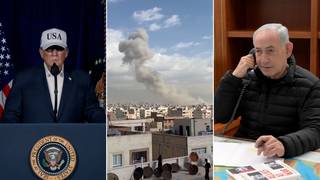

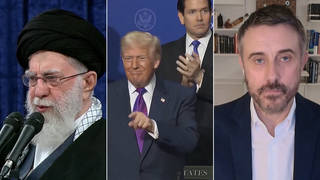
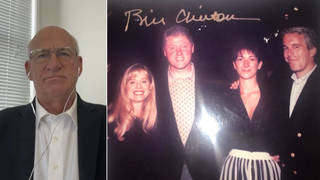




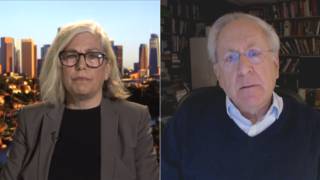
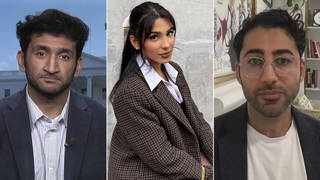
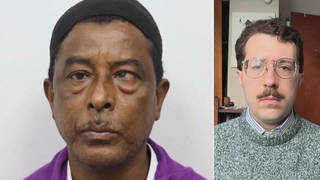

Media Options